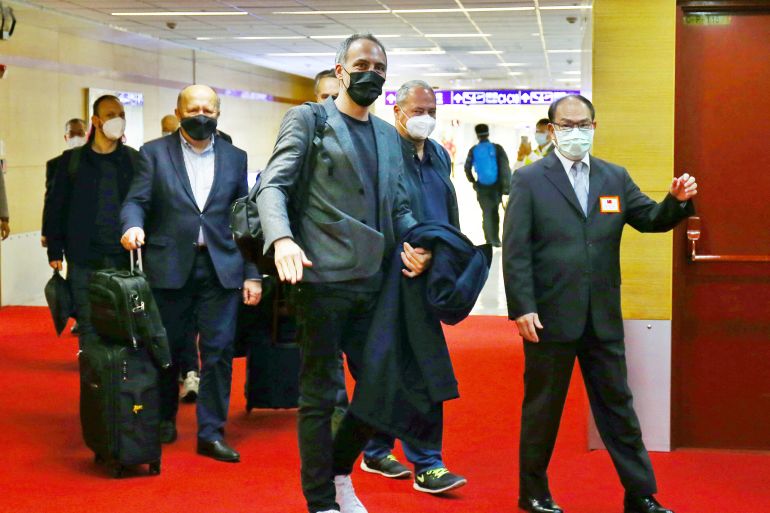EU legislators make historic visit to Taiwan amid China concerns
Visit comes amid concerns in the EU over alleged attempts by China to influence European politics and sow misinformation about the COVID-19 pandemic.

Taipei, Taiwan – A European Parliament delegation has arrived in Taiwan to discuss the self-ruled island’s experience in fighting disinformation and foreign interference in its democracy, media, culture and education.
Taiwan’s Ministry of Foreign Affairs welcomed the seven-member group on Wednesday, describing it as the “first official delegation dispatched by the European Parliament to Taiwan in history, which is of great significance”.
Keep reading
list of 4 itemsTaiwan’s Tsai has ‘faith’ in US help amid new China ‘intrusions’
China says Taiwan ‘has no right’ to join UN, after US nod
Taiwan taps on United Nations’ door, 50 years after departure
A warm #Taiwan🇹🇼 welcome to @Europarl_En's🇪🇺 #INGE delegation. We wish the 7 MEPs a rewarding visit aimed at getting up to speed on efforts to disarm disinformation, #DefendDemocracy & boost cyber resilience while promoting an environment for freedom of expression & information. pic.twitter.com/8hnQivb1wE
— 外交部 Ministry of Foreign Affairs, ROC (Taiwan) 🇹🇼 (@MOFA_Taiwan) November 3, 2021
The legislators’ visit comes amid concerns in the European Union over alleged attempts by China to influence European politics and sow misinformation about the COVID-19 pandemic.
Taiwan, which Beijing views as a breakaway province, says it too is a regular victim of Chinese disinformation campaigns and the European Parliament had recently praised the island’s success in addressing “interference in its democracy without restricting freedom of speech and media”.
The delegation, led by French Member of the European Parliament Raphael Glucksmann, said it will “discuss Taiwanese experiences in the fight against disinformation, attempts at interference in Taiwanese democracy, media, culture and education, as well as Taiwan’s efforts to reinforce its cyber-resilience”.
In a statement before his departure, Glucksmann added, “The experience of Taiwan in addressing repeated and sophisticated attacks through the mobilisation of its whole society, and without restricting its democracy, is unique.”
Stronger EU-Taiwan ties
The European delegates all hail from European Parliament’s Special Committee on Foreign Interference in all Democratic Processes, and will meet Taiwan’s President Tsai Ing-wen, Premier Su Tseng-chang and other top leaders over the course of their three-day trip.
Their visit also comes amid heightened tensions between China and Taiwan, with Beijing ratcheting up military pressure on the island by sending warplanes into its Air Defence Identification Zone (ADIZ). Western nations, who are increasingly concerned over China’s rise, have expressed concern over Beijing’s pressure on Taiwan and are seeking stronger relations with the island, despite not having formal diplomatic relations with the territory.
“Countering disinformation is a subject that enjoys broad support within the EU among member states, intensified by China’s influence operations and use of disinformation throughout the pandemic to undermine European democracy and unity,” said Zsuzsa Anna Ferenczy, a PhD research fellow at the European Union Centre in Taiwan at National Taiwan University in Taipei.
“In contrast, building closer ties with Taiwan is still work in progress inside the EU, precisely because of the China factor as member states have not agreed on the kind of relationship they want to have with China in the future. So for the (European Parliament) to use disinformation as a means to engage Taiwan is wise and provides a sustainable way forward,” she said.
China has condemned the EU’s actions, saying the European Parliament has undermined “China’s sovereignty and territorial integrity” through its support for closer engagement with Taiwan.
The EU is Taiwan’s largest source of foreign direct investment, but public engagement between both places has been more low-key until relatively recently.
Earlier this week, Taiwan’s Foreign Minister Joseph Wu returned from Europe where he visited the EU’s administrative capital at Brussels, as well as the Czech Republic and Slovakia, in another landmark trip.
Taiwan recently received a group of legislators from the French Senate just days after China sent a record number of flights into the island’s ADIZ, an area of the Taiwan Strait and continental Asia that is tracked by Taiwan’s military.
A delegation from emerging ally Lithuania is also expected later this year.
In their official engagement, Taiwan and its European allies in Central Europe and the Baltic region have emphasised their common experiences with overthrowing authoritarianism, but more recently Taiwan has taken to social media platforms such as Instagram to drum up support.
Taiwan’s Central News Agency recently launched the Instagram account “Hello Lithuania” to introduce the country to younger readers, with posts explaining the food, history, and culture of Lithuania and manga-like characters standing in for “typical Lithuanians”.
“All this EU-Taiwan activity now is the result of Taiwan’s efforts to be a meaningful partner for the EU, either in value or in concrete cooperation. Taiwan is also a showcase for the EU to promote its value-oriented policy in the Indo-Pacific area,” said Marc Cheng, the executive director of the EU Centre in Taiwan.
“Minister Wu’s visit to Europe was initiated by member states, not the EU, but it shows that member states are also more willing and open-minded to explore the possibilities to cooperate with Taiwan on many issues.”